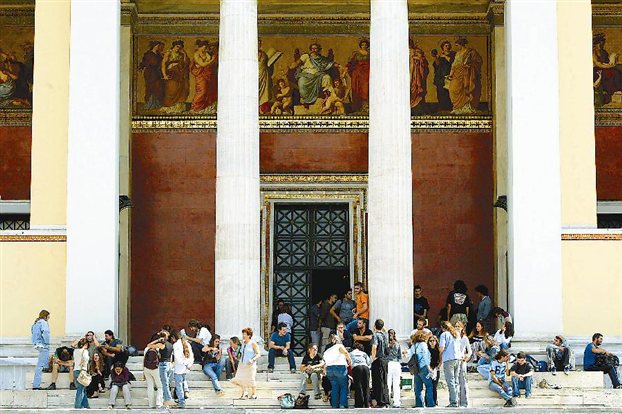Anastasia Balezdrova
The deadline set by the Ministry of Education for announcing the names of the 1,349 administrative employees who will be laid off expires today but the leaderships of the universities have not yet submitted the lists of their names.
Despite the insistence of the Ministry and the letter sent by the prosecutor's office to comply with the final date, the rector’s councils of eight universities continue to insist on withdrawing the ministerial decision. The employees, in turn, are still on strike but they are preparing to organize events and to receive the newly admitted students.
The atmosphere in secondary schools remains tense although the teachers have discontinued their strike. Some schools are still "occupied" by students despite the warning that the school year will be extended.
Against this background, Onassis Foundation’s "House of letters and arts" hosted a discussion on the subject of '' 'Educational Reformation' a forbidden concept?", involving three university professors and educational policy research workers.
"We cannot talk about educational reform in Greece. Numerous legislative changes are being promoted as a reform but they have changed nothing. Most often the new laws regulated the conduct of examinations in secondary schools and universities," said Professor of Comparative Education at the University of Athens Dimitris Matheou.
He described the Greek educational policy as centralized. "The state decides on all matters relating to the nature of the educational process and on the material presented in schools. In fact the people who should be involved in the determination of educational policy most of the time are dealing with operational activities associated with school routines."
In his opinion, one of the main reasons for the failure of the educational reform is the "party court" of some ministers. "These are different advisers and experts who are acting as intermediaries between the political leadership and the employees within the field of education. They almost always act as a "filter" in communication, thus preventing the initiation of a real dialogue about the nature of education."
According to Professor Matheou, there has never been a long-term plan for education in the strategy of the ministry and funding has always been problematic and insufficient. "I think that the state bears much of the responsibility for this but the problem does not lie in this alone. Stereotypes such as "where is the state" to solve a particular issue and denial of personal responsibility have become common among those employed in education which ultimately creates a very weak civil society."
According to him, in recent years, Greece has missed many opportunities to modernize the way of presenting scientific knowledge in schools and universities. "The European subsidies which were allocated have lead to nothing concrete and today's limited funding is actually an alibi for the continuing inaction on the part of the Ministry, regarding the drawing up of the educational policy," states Dimitris Matheou.
"At the same time, the world around us is evolving. The crisis in universities is not only a Greek phenomenon but Greece is doing nothing to modernize them whereas new educational institutions that have nothing to do with universities have emerged in many countries. If we do not start acting, Greece will remain outside the discussion about these dynamic changes," he concluded.
Assistant Professor of Educational Policy and History of Education at the Aegean University, Panagiotis Kimourtzis, described the corrupt relations between the state and the universities, and their impact on the educational process. In his opinion the ideological orientation of many teachers is playing a leading role in their work, negatively affecting their research activities and the creation of new knowledge.

"It is time to allow each university to develop independently and in accordance with its own purpose. The standardization of the processes has not improved education, it has resulted in the opposite," he said.
The fact that politics has entered schools, the incomplete actions on the part of the Ministry of Education and the poor funding are the main problems of Greek education, as stated by Assistant Professor of Pedagogy at the Ionian University, Kostas Angelakos. According to him, all the reforms that have been carried out in the past have had an ideological orientation. He criticized the current leadership of the Ministry which "continues the policy of settling some details without any vision for the future."
After the presentations, many participants in the audience said that they had given rise to more questions instead of providing answers to the question which is contained in the title.